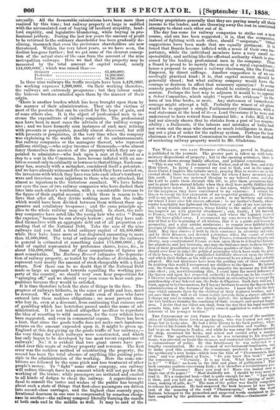THE WILL OF THE LATE DUCHESS D'ORLEANS, proved in England,
is published in the journals. The greater part is taken up with testa- mentary dispositions of property; but in the opening sentences, there is much that shows strong family affection, and political convictions. "This is my will. In the name of the Father, and of the Son, and of the Holy Ghost. In dying I commend my soul to God, and in the name of
Jesus Christ I implore His infinite mercy, praying Him to receive ins in the
eternal abode, there to reunite me to those for whom I have mourned upon this earth. I leave my maternal blessing to my beloved sons, and pray the Lord to guide them through this life, to give them prosperous days, and to grant them eternal felicity when they shall have nobly fulfilled their destinies here below. I bid them here a last adieu, whilst thanking them for the happiness they have contributed to my existence. I entreat the Queen to accept the last expression of my respectful gratitude. I bid fare- well to my mother, to whom I owe so much ; to my brothers and sisters,
for whom I have ever felt sincere affection ; to say mother's family, whose tender hospitality has lightened the bitterness of exile of my sons and my- self; to my friends and servants, whose fidelity in the midst of misfortune has inspired me with grateful attachment ; and, finally, I bid farewell to France, which I have loved so much, and where the happiest years of my life have glided away. I recommend my sons never to forget that the fear of God is the beginning of all wisdom, that it is a guide and beacon in prosperity, and a stay amidst misfortune ; to remain ever faithful to the precepts of their childhood, and continue steadfast likewise in their political faith. May they observe it both by their constancy in adversity and exile, and by their firmness and devoted patriotism when the course of events shall restore them to their country. May France, restored to her dignity and liberty, may constitutional France reckon upon them to defend her honour, her grandeur, and her interests, and may she find once more in them the wis- dom of their grandfather and the chivalrous qualities of their father. They should ever bear in mind the political principles which have made the glory of their house, which their grandfather faithfully observed upon the throne, and which their father, as his will and testament bears witness, had ardently adopted. His last directions have been the guiding rule of their education. In quitting this world I recommend my children to the Queen. My beloved son, the Count de Paris, will attain his majority the moment my will shall take effect ; yet, notwithstanding this I count upon the moral influence of the Queen and upon her respected authority to replace me in his councils; I likewise reckon upon her maternal solicitude in entreating her to accept the guerdianship of my beloved son, the Duke de Chartres. Such duty will not, I trust, appear to her too onerous, for I beg my brothers to assist the Queen in the administration of the fortune of their nephews. I know full well the feel- ings which animate them for the children of their deplored brother, and I am sure that they will at all times testify towards them a sincere affection. I charge my sons to remain ever closely united ; the indissoluble union of the two brothers forming the condition of their strength and mutual happi- ness. I desire that my eldest son shall, from the day. that his legal majority permits him, take part in the family council appointed to watch over the interests of his younger brother."
THE CENSORSHIP or THE PRESS IN NAYLBS.—In one of the maritime cities of Calabria there lived an apothecary, who was learned not only in drugs but in books also. He had a little library in his back parlour, whore he received his friends for the purpose of conversation and reading. Re had to go on business to Naples, and while he was away the police invaded his shop, examined his books, and seized and carried away a number of them. The apothecary himself, as he was returning to his despoiled home, was arrested on board the steamer, and conducted into the presumes of a commissioner of police. By this functionary he was subjected to lengthy examination. He was accused of revolutionasikendencics, fill to make good this accusation the commissary produced a book—one a the apothecary's own books—which bore the title of " Pharmacopeia Itak iana,' and was published at Turin. "Do you know this book. " Luken the commissary. "Certainly. It is my book. What harm can you see in it ? " " What ! no harm in the title and place of publication. This book contains matters concerning Italy; it is therefore a revolutionary Pro- duction." " Nonsense ! Have you read it ? Have you looked over a single one of its pages ?" "Meet decidedly not. I should be very semi' t° read it. It's a suspected book—that is quite enough. for me." "„net open it them and you will see that it treats of nothing but mixing of inW1-, eines, making of pills, &c.” The man of the police was finally compellen to release his prisoner. He had suspected the book because he was jell*: rant of the meaning of the word " Pharmacopeia " while the wer: Italians belonged to the proscribed and suspected woks contained in p
view.
lists compiled by the gentlemen of the Home Office.—Continental AO.


























 Previous page
Previous page